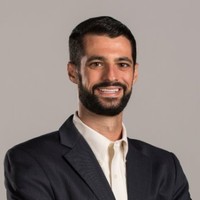
Gregory P. Burke
- Courses5
- Reviews11
- School: Fairfield University
- Campus:
- Department: Accounting
- Email address: Join to see
- Phone: Join to see
-
Location:
1073 N Benson Rd
Fairfield, CT - 06824 - Dates at Fairfield University: November 2016 - April 2018
- Office Hours: Join to see
Biography
Fairfield University - Accounting
Experience
Fairfield University
Senior Interviewer
Gregory worked at Fairfield University as a Senior Interviewer
Fairfield University
Instructor of the Practice, Accounting
Gregory worked at Fairfield University as a Instructor of the Practice, Accounting
Rostro de Cristo
International Volunteer
Gregory worked at Rostro de Cristo as a International Volunteer
Duke University - The Fuqua School of Business
Accounting PhD Student
Gregory worked at Duke University - The Fuqua School of Business as a Accounting PhD Student
PwC
Assurance Senior Associate - Asset Management
Gregory worked at PwC as a Assurance Senior Associate - Asset Management
Education
Fairfield University
B.S.
Accounting & Economics
Minors: Mathematics & Philosophy Summa Cum Laude Scholarships: Fellows Scholar; Magis (one of first eight offered at Fairfield University), CSCPA Scholarship, PCAOB ScholarshipLoyola Medal
This award is the highest honor presented annually by the Alumni Association and Administration & Student Affairs to one senior. Instituted in 1952, The St. Ignatius Loyola Medal Award recognizes one senior who has committed himself or herself to the Jesuit education ideals of maintaining high academic standards in addition to substantial involvement in community service and/or extracurricular activities. The student should have clearly maximized opportunities for intellectual, emotional, and social growth throughout their time at Fairfield and best exemplifies the true spirit of a Jesuit education.Fairfield University
Senior Interviewer
Fairfield University
Instructor of the Practice, Accounting
Duke University - The Fuqua School of Business
Doctor of Philosophy - PhD
Accounting
Duke University - The Fuqua School of Business
Accounting PhD Student
Publications
Emergent Properties: Interdisciplinary Team Teaching in Literature and Biology
Currents in Teaching and Learning
Abstract: In this essay, we reflect on the outcomes of our interdisciplinary, team-taught, undergraduate core course in modern literature and evolutionary biology--a course designed to study the problems of identifying the emergence of distinctly “human” beings. The essay reflects on the positive, unexpected outcomes that we experienced, especially in student writing, via the metaphor of “emergent properties,” a biological term that refers to how new and complex traits, behaviors, or life forms emerge from the interaction of “simpler units” which in themselves would not produce these properties. Given that so much of the course content came from the students themselves—in particular, from their interest in the question of human consciousness as an evolved trait—we have incorporated excerpts from student essays that were produced for the course. These excerpts are preceded by student reflections and accompanied by observations about the compelling fashion in which students synthesized not only scientific and literary content, but also objective and subjective writing styles.




